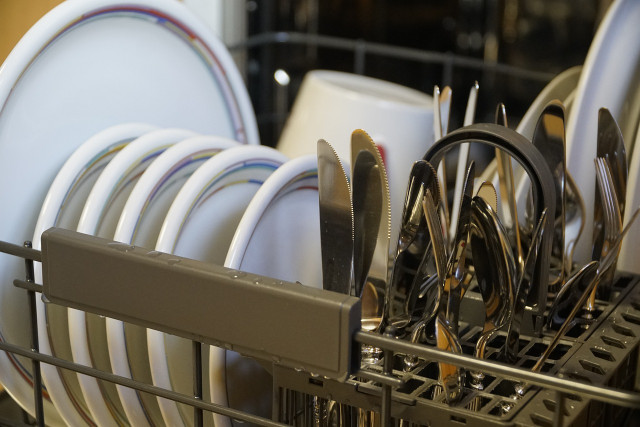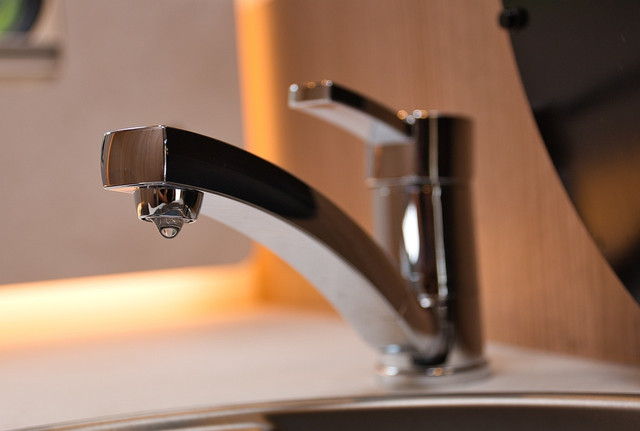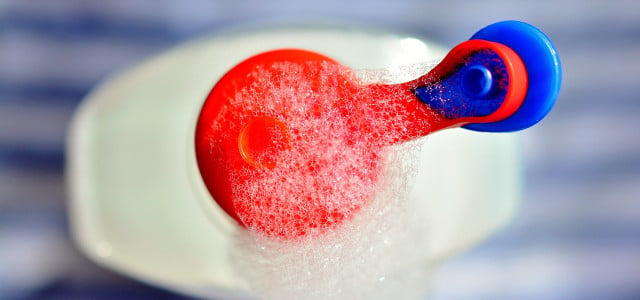Which is more efficient, washing dishes by hand or in the dishwasher? How much water does a dishwasher use? Here’s everything you need to know to wash up more eco-friendly.
If you’re in the market for a new dishwasher or wondering whether handwashing or machine washing your dishes uses more water, we’ve got you covered. We’ll help you start saving water, so you can keep your kitchen eco-friendly while lowering your water bills.
A dishwasher is usually more energy-efficient than washing dishes by hand. However, depending on how you handwash your dishes, it can be a gray area. Read on for the water usage of dishwashers and handwashing to help you make an informed decision.
For more information about sustainable kitchen practices, check out Utopia’s popular article, 10 Things You Need To Ban From Your Kitchen.
How Much Water Does A Dishwasher Use?

Some factors that affect how much water a dishwasher uses are the type of cycle you select, how full the load is and the model of your dishwasher. You’ll need to look up your specific brand to find out exactly how much water it uses per normal load cycle.
Thankfully, most commercially available brands manufactured since 2011 will come with an ENERGY STAR certificate. ENERGY STAR certificates for dishwashers are a government-backed symbol for overall energy efficiency. The specifications for approved products are sorted in an online database.
According to the database, some compact dishwashers use as little as 1.6 gallons of water per cycle. However, older dishwashers use over 10 gallons per cycle. The average modern dishwasher uses about 4.5 gallons of water, with energy-efficient dishwashers often having a lower water usage than standard models.
If you are unable to find how much water your dishwasher uses through the ENERGY STAR database, check the manufacturer’s instructions or contact their customer service department. Read our article 8 Dishwasher Mistakes for more tips and tricks on how to use your dishwasher in the most eco-friendly way.
How Much Water Does Handwashing Use?



According to a widely cited study, hand-washing 12 place settings uses, on average, 27 gallons of water. In this study, however, many of the test subjects ran the hot water continuously as they washed. Some left the tap running while they dried the dishes.
The average kitchen faucet has a flow rate of 2.2 gallons per minute, meaning that you’d only have two minutes to wash an entire dishwasher’s worth of dishes to match a dishwasher’s water efficiency if you leave the tap running. However, this is more than enough time to fill up a sink enough to clean your dishes.
It follows that washing dishes with conservation in mind will use much less water. Even just by shutting off your water unless you need it to rinse, you are likely using less than 5 gallons of water to wash your dishes by hand.
Water efficiency also depends on how many dishes you’re washing. For example, if you live alone or have a small family, washing dishes by hand might be just as water and energy efficient as a dishwasher. However, if you have a large family, hand-washing will be more inefficient.
Can You Save Water by Washing by Hand?



If you decide that dishwashing is the most efficient method for your needs, there are still some instances where hand-washing is necessary. For example, there are certain pans you shouldn’t put in the dishwasher since it can cause rust or damage.
Many people also don’t own a dishwasher and are not in a position to purchase one. If this is you, you can still minimize your water usage. There are many ways to do so, including:
- Filling your sink with less water
- Not letting the water run while you’re scrubbing dishes
- Filling one basin with soapy water for washing and another with clean water for rinsing
- Scrape as much food as you can into the compost before washing
- Installing a faucet aerator
Manual dishwashing actually has the potential to have the lowest energy use when recommended behaviors are followed. Get creative and find the absolute minimum amount of water needed to clean your dinnerware. If you use soapy water to fill your toilet tank or your rinse water to water plants, your usage overall will be less anyway!
Read more:
- Is Tupperware Dishwasher Safe? Just Check This 1 Thing
- Effective & Fast Home Remedies for Clogged Drains
- Homemade Dish Soap: DIY Dish Soap and Dishwasher Detergent
Do you like this post?






